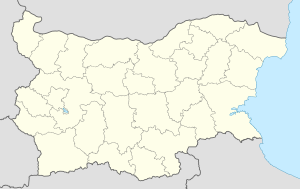|
Electricity sector in Bulgaria
 The electricity sector in Bulgaria is an important part of energy in Bulgaria and is highly diversified. As of 2021 nuclear power accounts for 34.7% of Bulgaria's power, coal power provides 39.4%, while renewable energy provides 15.8% of the country's electricity needs.[1] Power production Bulgaria consumes about 35 TWh of electricity per year,[2] and some is exported.[3] The residential sector is the largest consumer, followed by industry then services.[4] Nuclear powerNuclear power generates about a third of electricity in Bulgaria. Bulgaria's first commercial nuclear reactor began operation in 1974.[5] The Kozloduy NPP operates two pressurized water reactors with a total output of 1906 MW. This makes Bulgaria the 21st-largest user of nuclear power in the world. Construction of the Belene Nuclear Power Plant was officially terminated in March 2012, and a thermal powerplant was supposed to be built on the site.[6] Efforts in May 2018 to restart the Belene project were unsuccessful. As of 2022[update], Bulgaria plans to construct new reactors at the existing Kozloduy site,[7] and at Belene.[8] Bulgaria has the Kozloduy Nuclear Power Plant with two pressurized water reactors (together 2000 MW net). Four old and unsafe VVER-440/230 reactors (4 x 408 MW net) were taken off-line in 2004 and 2007). The two active reactors cover almost half of Bulgaria's electricity demand.[9]Coal powerSome power stations are very dirty,[10][11] and in 2023 one was found guilty of excess sulphur dioxide air pollution, which might lead to court cases against others.[12] In early 2023 the government attempted to postpone Bulgaria's EU commitment to reduce greenhouse gas emissions by 10% that year, because it did not want to close any coal-fired power stations.[13][14] Fossil fuel subsidy of coal power is expected to end by 2025.[15] Bulgaria aims to phase out coal power (which is low quality lignite[16]) by 2038 or earlier.[17] The Center for Research on Energy and Clean Air says that an earlier phase out would save many lives and much money. [18] Hydropower  Wind powerWind power generated 2% of electricity in 2023.[21] By the end of 2020 almost 1 GW of onshore wind power had been installed.[22] It has been estimated that there is potential for at least another 2 GW by 2030.[23] The total wind power grid-connected capacity in Bulgaria was 702 MW as of 2023.[24] An energy island in the Black Sea has been suggested for joint development with wind power in Romania.[25]Solar power Solar power generated 12% of Bulgaria’s electricity in 2023.[26] By the end of 2020 about 1 GW of solar PV had been installed.[27] It has been estimated that there is potential for at least another 4 GW by 2030.[28] On March 13, 2023, peak photovoltaics power was 30% of Bulgaria electricity generation. However, long-term share of solar power is much lower. Director of Bulgarian transmission network estimated photovoltaics growth as 30% in 2022, also he expects 700 MW new solar capacity in 2023, which could represent 30-40% YoY growth. In April 2023 Bulgaria's Inercom signed contract with Huasun for supply of 1.5GW solar modules.References
|
||

